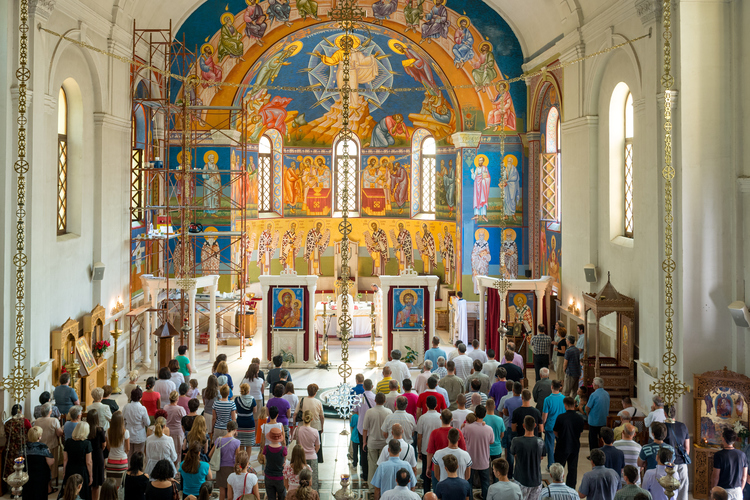
Skywatching Tips for December 2025
What’s up in the day and night sky in December 2025, including the Geminid meteor shower and the December solstice.
Christian holidays commemorate and celebrate the works of God in Jesus of Nazareth (Jesus Christ) throughout the year.

Sunday mass in Orthodox church in Trebinje, Bosnia and Herzegovina.
©iStock.com/istankov
Christian holidays and feasts are based on the liturgical calendar, which is primarily based on the solar year.
The dates of some holidays, like Christmas, therefore, are fixed in the Gregorian calendar. The date of other holidays, like Easter, are based on the Moon phase. Because of this, it changes every year, even though the holiday falls on the same day of the week.
Different denominations within Christianity follow different liturgical calendars. For example, the year in the Western Christian calendar begins on the first Sunday of Advent—the first Sunday closest to the Feast of St. Andrew, which falls annually on November 30 in the Gregorian calendar. In the Eastern Christian traditions, the year begins on September 1.
For observing Christians, a liturgical year or church year is a cumulative celebration and commemoration of the “saving works of God in Jesus Christ” throughout a calendar year.
The year is divided into seasons, each of which begins on the day of a moveable feast. Because of this, the length of each season varies/may vary from year to year. Most denominations observe six seasons, each representing a significant event in the life of Jesus Christ. These six seasons are Advent, Christmas, Lent, the Paschal Triduum, Easter, and Ordinary Time.
Astronomical versus meteorological seasons
Every liturgical season has a color associated with it. The color for the Christmas season, which begins on December 25 and ends the day before Epiphany, is white, while the color for Lent is purple or violet.
A liturgical day spans from midnight to midnight, just like its counterpart in the Gregorian calendar. The celebration of Sundays and other solemnities, however, begins on the evening of the day before.
At timeanddate.com, we only show the main date in our calendars and yearly holiday lists, although the observance may begin on the previous night.
In addition to Sunday, the holiest day of the week within the church, the church calendar has several events of note throughout the year.
Within the Catholic Church, solemnities are the most important events. Celebrations begin the evening before with first vespers or evening prayers. These include Easter, Pentecost, the Immaculate Conception (December 8), Assumption (August 15), Solemnity of St. Joseph (March 19), and the Solemnity of St. Peter and St. Paul (June 29).
Feasts are second in line in order of importance within church celebrations, while memorials commemorate a saint and can be obligatory or optional.
In Eastern Christian traditions, Pascha or Easter is the holiest day of all. Easter is followed by the twelve great feasts in importance, three of which are moveable with their dates depending on the date of Easter.
| Feast | Orthodox Calendar Date | Gregorian Calendar Date | |||||||
|---|---|---|---|---|---|---|---|---|---|
| Epiphany | January 19 | January 6 | |||||||
| Presentation of Christ (Candlemas) | February 15 | February 2 | |||||||
| Annunciation | April 7 | March 25 | |||||||
| Palm Sunday | Sunday before Pascha | Sunday before Easter Sunday | |||||||
| Ascension Day | 40th day after Pascha | 40th day after Easter | |||||||
| Pentecost | 50th day after Pascha | 50th day after Easter | |||||||
| Feast of Transfiguration | August 19 | August 6 | |||||||
| Assumption of Mary | August 28 | August 15 | |||||||
| Nativity of the Theotokos | September 21 | September 8 | |||||||
| Exaltation of the Cross | September 27 | September 14 | |||||||
| Feast of the Entrance | December 4 | November 21 | |||||||
| Nativity of Christ | December 25 | January 7 | |||||||
Sunday is the first day of the week in the Christian tradition. It is a day to celebrate the paschal mystery, which refers to the death and resurrection of Jesus Christ. Sunday is also often called the Lord’s Day by observing Christians.
In the Catholic tradition, Sunday celebrations can only be replaced by solemnities or feasts of the Lord. However, Sundays in the seasons of Advent, Lent, and Easter rank high. If any solemnities fall on these Sundays, they are observed on the preceding Saturday or the following Monday.
At timeanddate.com, we only show the date of a Solemnity and not the day it is observed in the church unless the observed day has been declared a public holiday in the country.
Several Christian holidays have elements or traditions that may have originated from pre-Christian or pagan practices, as the Christian Church often incorporated local customs and traditions to make the transition to Christianity more palatable for the local populations.
It’s important to note that the incorporation of pagan elements into Christian holidays doesn’t necessarily diminish their religious significance for Christians today. Some of these holidays and their potential pagan origins or influences include:

What’s up in the day and night sky in December 2025, including the Geminid meteor shower and the December solstice.

Discover when, where, and how to watch the 2025 Geminid Meteor Shower, one of the greatest meteor showers this year. Includes tips for catching the best views.

When humans return to the lunar surface in 2027, they’ll land near the South Pole. We show you how to find it while gazing at the Moon.

Discover the phases of the Moon in December 2025. Also, why does the Full Moon appear higher in the sky in the winter months and lower in summer?